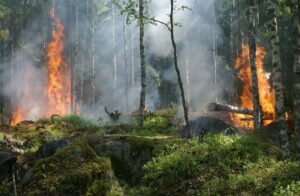Nature’s first green is gold,
Her hardest hue to hold.
Her early leaf’s a flower;
But only so an hour.
Then leaf subsides to leaf.
So Eden sank to grief,
So dawn goes down to day.
Nothing gold can stay.
—(Robert Frost, 1923)

Photo by Luis Dalvan from Pexels
Nature has the power to heal our mind, body and soul. The soothing breezes, budding flowers, warmth sunlight, green landscapes and picturesque rivers possess the potential to make us feel calm, happy and relaxed. In the contemporary era, issues such as urbanization and industrialization have transformed the natural functioning of the ecosystem by exploiting the resources that human beings are bestowed with since the inception of life on the earth. Due to this, the planet earth is heading towards destruction as there are a large number of flora and fauna that fall under the list of extinct and endangered species. Keeping this into consideration, I have decided to design the project on the topic ‘Recreating The Future: Towards the Goal of Sustainability’ , an Environmental Science topic for students studying in grade 11 by incorporating inquiry-based pedagogy.
Aim of the Project
The purpose is to facilitate students in building a better connection with natural surroundings by acquiring in-depth knowledge about practices in relation to building a sustainable environment. In addition to this, the objective of this inquiry project is to nurture inquisitiveness among students by providing them with an opportunity to gain knowledge and develop an understanding of the cultural connection that they share with the environment.
An Indigenous Perspective
While discussing issues related to sustainability and ecological restoration, it is essential to understand the traditional ecological knowledge that has been largely overlooked in Environmental Education. Traditional ecological knowledge is described as “rational and reliable knowledge that has been developed through generations of intimate contact by native people with their lands” (Mauro and Hardison, 2000). In recent years, traditional ecological knowledge has been receiving great attention as it plays an integral role in contemporary science which involves ecology, conservation biology, pharmaceutical botany, forestry, and fish and wildlife sciences as reported by The World Conservation Union (IUCN). Moreover, it also includes detailed observations of population ecology and species interactions, emerging from long-term association with a particular flora and fauna (Kimmerer, 2002).

https://www.pexels.com/photo/forest-on-fire-51951/
Major Controversies
One of the prominent controversies is the indifference between developed and developing countries. There is a significant increase in the carbon emission due to the economic growth and higher standards of living in developed countries as compared to developing countries which are the most affected ones despite their minimum contribution to the climate change. Karen Ellis acknowledged that “The poorest countries should not have to sacrifice growth to tackle climate change – a problem caused mainly by rich countries. But they will need to rethink their growth strategies if they are to maximize their future growth prospects” (“Must developing countries sacrifice growth to save the planet?”, 2009). Furthermore, there has been a substantial increase in the forest fires by 13% across the world in April 2020 as compared to previous years due to climate change and other human actions such as land conversion for agriculture and poor forest management (“Fires, forests and the future: A crisis raging out of control,” 2020). Hence, this current trend portrays the devastating effect of forest fires on flora and fauna in the upcoming years.
Key Questions
- Is there any scientific research that proves that there is a way to bring back the extinct species of flora and fauna?
- Can you think of any alternative to flora and fauna in the future? Is there any possibility to replace them?
- What can you predict about life on the earth after 30 years?
- How do you perceive the relation between culture and nature?
Key Questions
- What responsibilities do wealthy nations demonstrate for protecting the lands in poorer nations?
- What is the relationship between human actions and the sustainability of an ecosystem?
- What is the impact of a healthy ecosystem on the well-being of humans?
- How might Indigenous knowledge help us to heal the earth?
These key questions will empower students to visualize “things differently for more enriched, novel, vital, or deeper meanings”. In addition to this, these questions will provide a clear direction to the process of inquiry as “inquiry is not an abstract exercise but a living practice”(Heesoon Bai, 2005). The topic ‘Recreating The Future: Towards the Goal of Sustainability’ requires an in-depth exploration by dwelling deeper into the serious environmental concerns and fostering the skills among students to think critically about the world which is beyond the scope of academic knowledge that they acquire through textbooks.